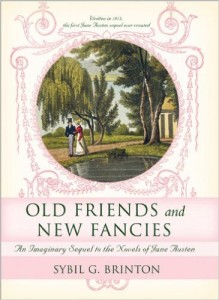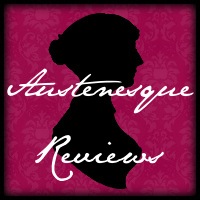 The latest JAFF fuss is about some kind of “bubble” and suggestions that soon, the “meteoric” trend of Austen-inspired novel sales will reverse itself. The belief is that the 200th anniversaries and the adaptations drive the market. I’m not the only blogger who disagrees, but I propose a different reason for the escalation in Austen-inspired books.
The latest JAFF fuss is about some kind of “bubble” and suggestions that soon, the “meteoric” trend of Austen-inspired novel sales will reverse itself. The belief is that the 200th anniversaries and the adaptations drive the market. I’m not the only blogger who disagrees, but I propose a different reason for the escalation in Austen-inspired books.
The oldest JAFF novel listed on Austenesque Reviews is Old Friends and New Fancies by Sybil G. Brinton from 1914. It’s fairly well documented that P&P ’95 was a big influence on the proliferation of unpublished JAFF. Several web sites started for that purpose, and at one time, there were a good dozen multiple-author forum sites. But it wasn’t easy to get it published back then.
 From Austenesque Reviews‘ lists, between 1995 and 2005, the total number of JAFF books published was less than in a month today, which according to Meredith Esparza at Austenesque Reviews is around 30. That’s in 10 years! They were mostly paper, as the attitude towards e-books was “Why pay when you can read on your computer for free?” Vanity publishers like Lulu charged around $60-$100 to convert and host your e-book.
From Austenesque Reviews‘ lists, between 1995 and 2005, the total number of JAFF books published was less than in a month today, which according to Meredith Esparza at Austenesque Reviews is around 30. That’s in 10 years! They were mostly paper, as the attitude towards e-books was “Why pay when you can read on your computer for free?” Vanity publishers like Lulu charged around $60-$100 to convert and host your e-book.
E-readers hit the market in late 2007, but didn’t become popular immediately, as they cost $299 and were only available in the US.
In each of 2008 and 2009, the number of Austen-inspired novels published was similar to that published in a month today. Sourcebooks published a few JAFF novels each year, and starting in 2009, so did Meryton Press. The odd book was published by various other publishers, just as they are today. The number published slowly increased so in 2012, 62 books were published.
The biggest boost to published JAFF came when Kindle changed its input format for self-publishing. In 2011, Rafe Carlson had to program An Unpleasant Walk into Kindle format herself to publish the JAFF novel as an e-book on Amazon in September of that year. By the same time in 2012, I could put my formatted MS Word document of Alias Thomas Bennet directly into Kindle and have it pop out an e-book, complete with interactive TOC. In 2013, the number of JAFF books published nearly tripled from the previous year. When I scan Amazon, it appears that most Austen-inspired novels are self-published.
Now for my original point—is this about to end any time soon? From reading blogs of romance authors talking about how to set their price points, I discovered that a JAFF novel is a cash cow. An unknown JAFF author can sell more copies of their first Austen-inspired novel in the first month, with no marketing, than most newbie self-published romance writers sell in a year. JAFF novel sales are no longer the best-kept secret held by a handful of authors, but by no means will the market be saturated any time soon!
References:
- A Comprehensive Guide to Austenesque Novels on Austenesque Reviews.
- Amazon Kindle, Wikipedia.


To me, JAFF is a cash cow within the romance genre because they get better sales and command higher prices than a similar mainstream romance novel. I do believe you just put it out there and get readers. All of us have bought poor JAFF books, and some are really horrible!
I’ve read blogs where romance authors claim to sell under 10 books a month on average in the first year, and these were not first-time authors. From my limited knowledge, JAFF novels sell 10-20 times that, depending on the author’s reputation, the appeal of their book, and how well the word of their release gets around the community. I’ve also read reports from other romance authors who sell similar numbers as JAFF, but they were well known and in a hot sub-genre.
JAFF is priced higher than Regency romance, too. New JAFF authors with decent but unexceptional novels are asking $3.99-$12.99, and their book sells well. Not as well as Bridget Jones’ Diary, but 10x more books than the poor romance novelist who’s pricing at $2.99, and I’ve read better at $0.99 by known Regency romance authors.
As far as a full bank account goes, I would never suggest that for a JAFF author. It’s difficult to make a living writing fiction, and rare to to make a fortune. I know of several popular Regency romance authors who release 3 or more novels a year and keep their day jobs. New authors who expect more may have set their hopes too high–if their book was that good, they should have had an advance from a big publisher. Even so, I was friends with a Pulitzer Prize-winning novelist who kept teaching after her win, though she did buy a house in rural France!
Thanks for asking good questions, Christina!
But define cash cow? Unfortunately, I still know a lot of talented, newly published authors desperately trying to get noticed in a saturated genre. I wish it was that easy–just put a JAFF book out there and voila, lots of readers, then full bank account. I agree JA has a ready-made audience that makes it helpful to find readers–it’s still a challenge to get readers to buy. IMO
Thoughtful post. Well done.
JAFF readers and writers have always come and gone over the years. We now have at least 10,000 readers and a few hundred writers. I don’t see it as a bubble, but a natural growth. No matter what you call it, as a reader and a writer I also want it to last. I always worry about what’s happening to Darcy and Elizabeth if I’m not immersed in a story about them, and it’s been almost 8 years for me.
Thanks, Sheila!
Claudine, to me, until the sales of that new, shy, non-marketed JAFF writer are the same as any other novice romance author, JAFF continues to be a hugely popular sub-genre where many readers will buy anything that comes out. A drop in sales to match regular romance novels would signal too many books for the number of readers. But it’s a huge gap to bridge, and that’s why I think it won’t end any time soon.
As far as quality goes, at the moment, JAFF quality exceeds that of the average romance novel in my experience. That is, there is a far greater percentage of duds and badly-edited novels out there in other areas of romance writing. You have to be pretty good with language and discipline to read Austen in the first place, and most Austen readers and writers among my friends are well-educated. That often translates into writing skills and discipline.
Thanks so much for the comment!
I read your remarks on the blog about the bubble. Very interesting. I don’t find that my interest in reading JAFF is waning. But I also agree that I am more likely to buy an historical romance novel under the JAFF heading now than other romance novels. Ironically I find so many of the historical romance novels are even free on many sites, i.e., BookBub. But I am obsessed with Darcy and Elizabeth variations. And that is over and above prequels, sequels and variations on Jane Austen’s other novels. This is only in the last several years as prior to that I read books in other genres as well as historical romance books. Kathleen Woodiwiss and Judith McNaught was my favorite authors in the latter genre.
But I did find your comments interesting. As a reader I do hope the “bubble” lasts.
Interesting article. I’m curious why you don’t think the market will be saturated soon? I agree, as long as high-quality work continues to be written, but I was wondering if you had a different opinion.